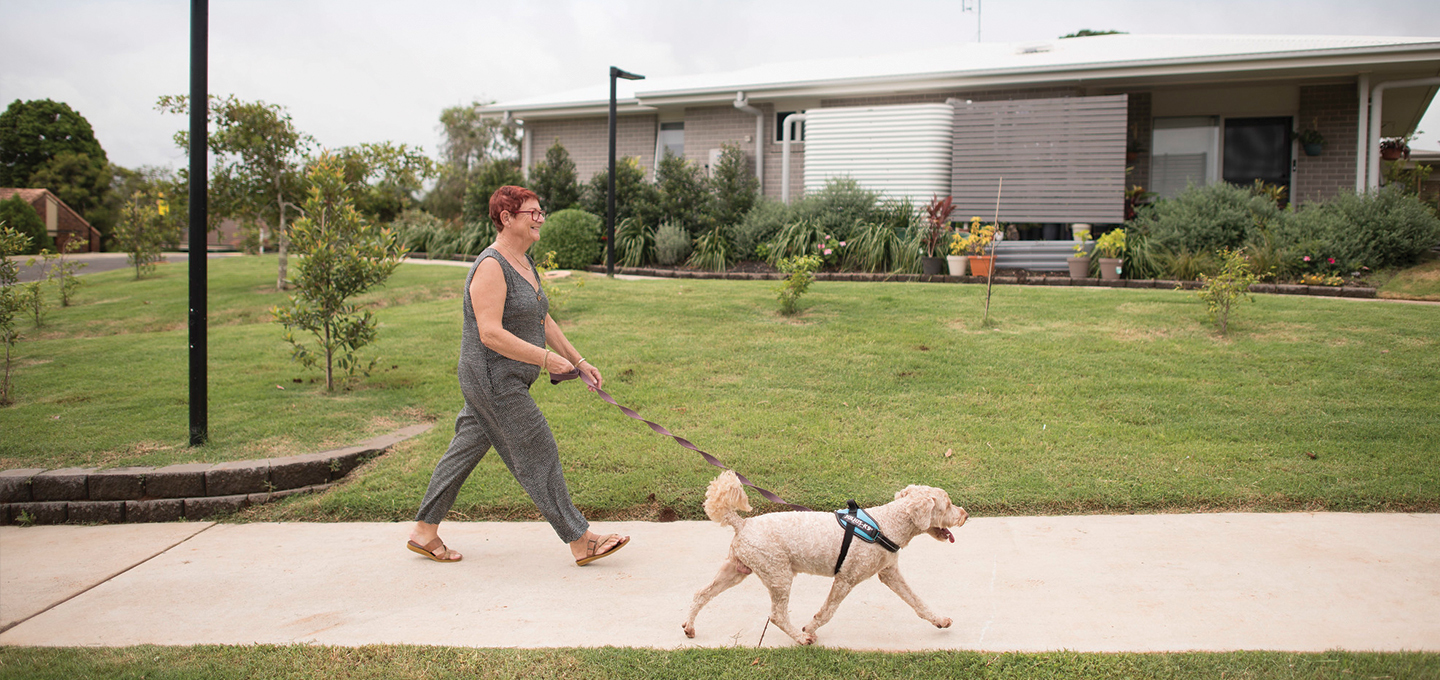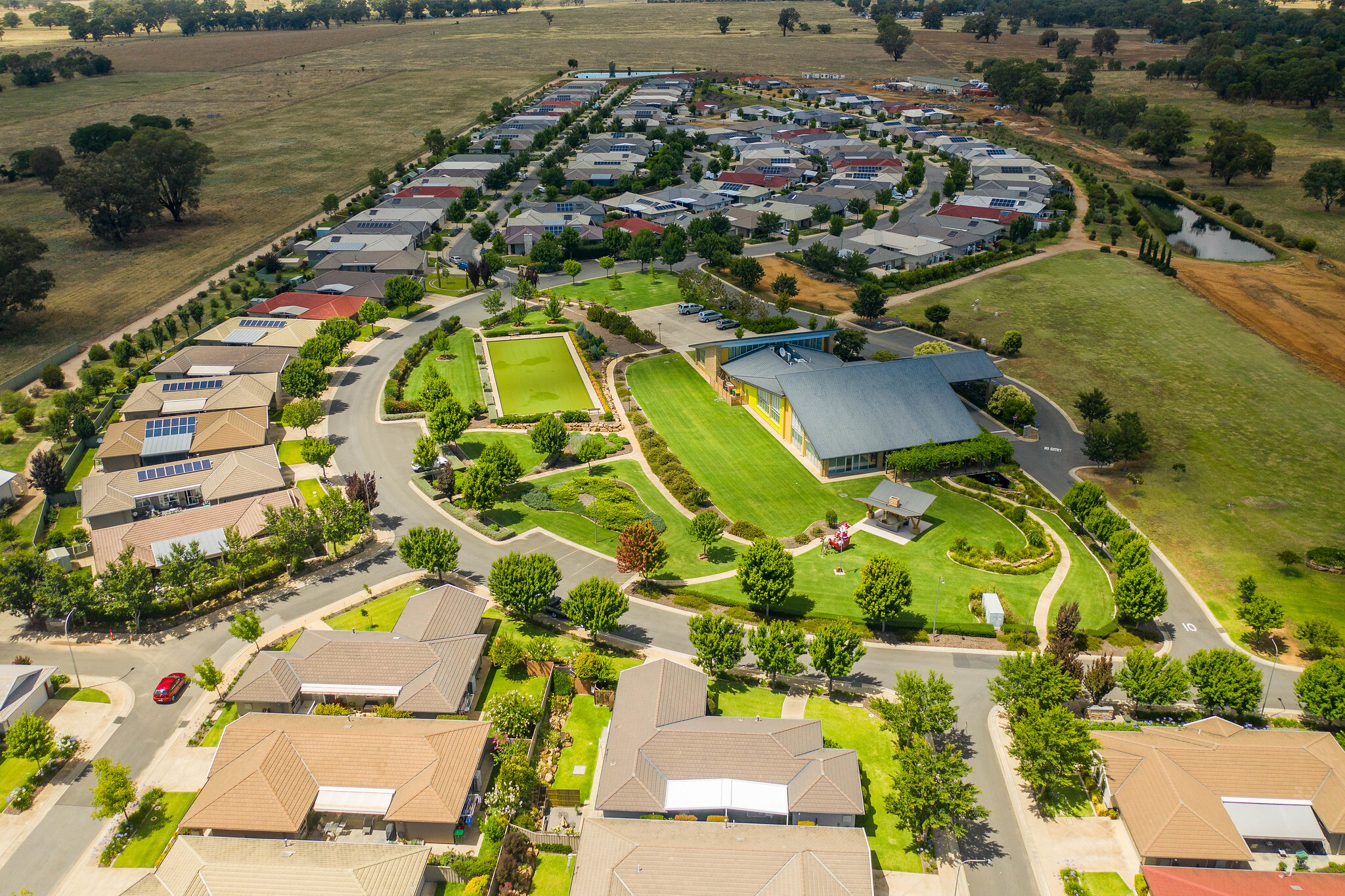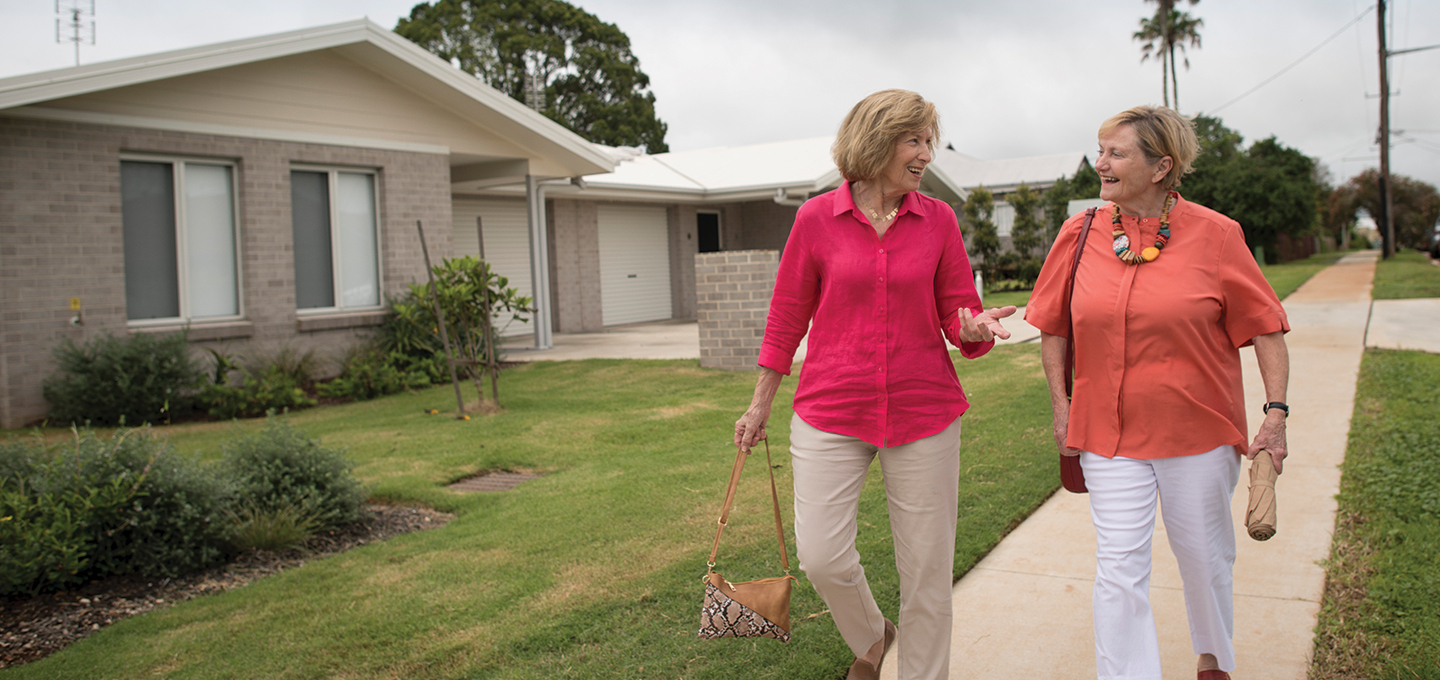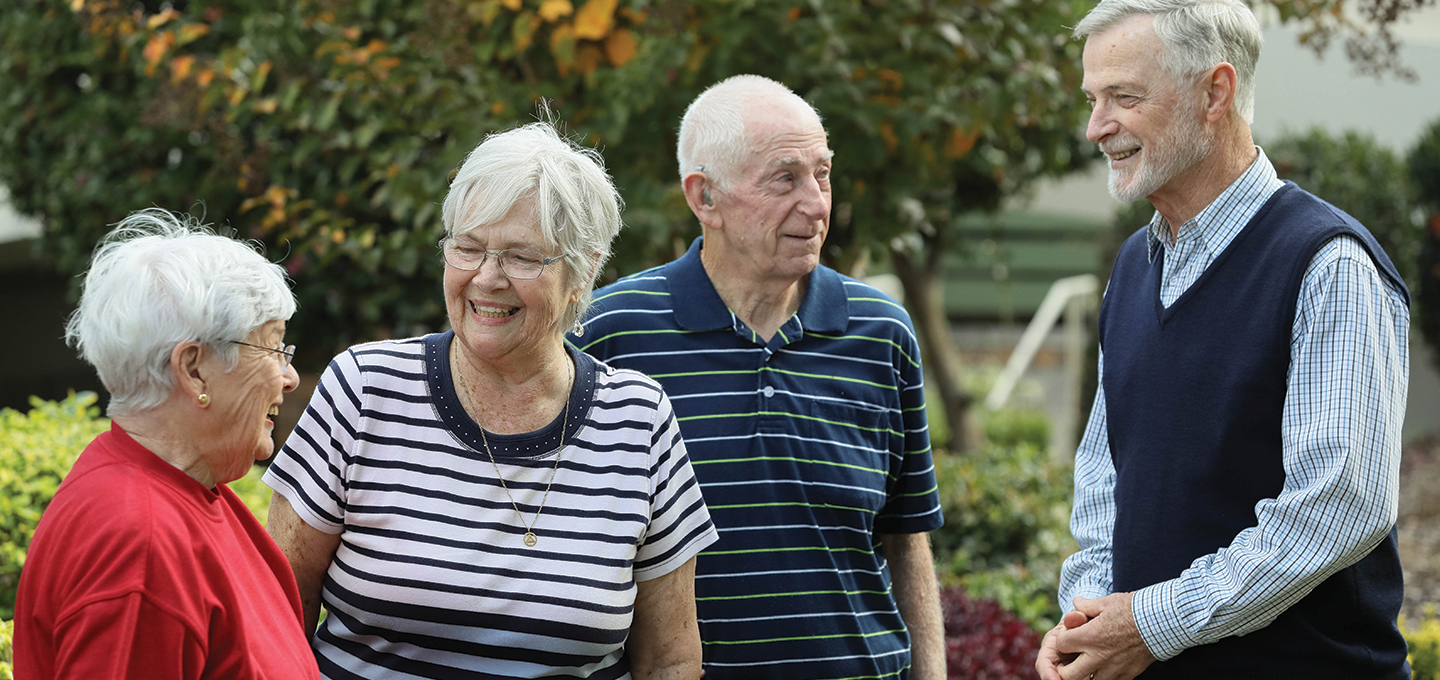How do retirement villages work and what are the benefits?
Retirement villages are an increasingly popular place to be - offering the charm of a close-knit, sociable community, the relief of little to no maintenance costs, and options to receive care in your own home if your health needs change over time.
Scroll to Explore

01 January 2025
Stories
| Retirement Living
How do retirement villages work and what are the benefits?
Retirement villages are an increasingly popular place to be - offering the charm of a close-knit, sociable community, the relief of little to no maintenance costs, and options to receive care in your own home if your health needs change over time.
What is a retirement village?
A retirement village refers to a community of houses, units, apartments or villas and complex community facilities designed for people over the age of 55, typically those who are seeking an active, independent lifestyle amongst others at a similar stage of life.
Retirement villages can vary in size and might be home to anywhere from 10 to a few hundred people. Often, they have their own onsite amenities like swimming pools, cafes, and bowling greens, creating that ‘village’ feel and a strong sense of community.

What type of accommodation is available in a retirement village?
There are many different accommodation types to choose from and as always, the options will depend on the community you choose and its location – you might prefer to live in a villa, a detached or semi-detached house, or an independent unit.
A BaptistCare, the most popular form of accommodation amongst residents is still a unit or apartment with one, two, or three bedrooms. Many people are keen to downsize to a smaller place, ditching the hassle of home and garden maintenance and enjoying the communal facilities within the village.

What is the cost of retirement living?
Most of the time, buying into a retirement village is significantly more affordable than the local housing market.
The 2021 Retirement Living Census found that retirement village homes were significantly less than the median house price in the same postcode with prospective residents seeing their retirement village home valued at around 80 percent or less of a similar property in the local housing market, dependent on their choice of operator.
Some principles stay the same though, and just like the wider housing market, the costs of retirement living can vary greatly depending on factors like location, size of the unit, and what kind of facilities are available within the village.
Entry payment and recurrent fees
When you move into a retirement village, you pay a lump sum called an Entry Payment, also known as an Ingoing Contribution. This is based on the market value of the property. There are also recurrent, fortnightly fees to pay whilst you live in the community, a little bit like strata levies, which cover general maintenance and upkeep of the village as well as the small team of staff who manage this for you.
How do exit fees work?
When you leave the retirement community, your entry payment will be returned to you, minus an exit fee, also known as a Deferred Management Fee (DMF). This is commonly around 30 percent of what you initially paid if you lived in the village for an agreed minimum term (usually five or six years).
The DMF covers the ongoing improvement and sometimes the expansion of village facilities to ensure residents can enjoy them long into the future. It also means that providers like BaptistCare can effectively subsidise residents’ recurrent fees, keeping them at a more affordable rate.
The exact amount of your DMF can be customised based on your individual circumstances. For example, you can choose to pay a lower entry payment and have a higher percentage of it deducted when you leave the village. Or, you can choose to pay a higher entry payment and have less deducted – or even a full refund – when you leave.
For a comprehensive guide on financials, read our blog “How much does it cost to live in a retirement village?”

Why choose to live in a retirement village?
If you are thinking about buying into a retirement village, you might be curious to know what sets them apart from any other private property development.
Here we describe the key draw factors to retirement living:
1. Feeling part of a community
One of the strongest attractions to retirement living is the dynamic social scene that comes with it! Having regular connection with others as part of a close-knit community is so important for mental health and wellbeing, particularly in older age when isolation can pose a risk.
Living amongst like-minded people at a similar stage of life makes for a peaceful, friendly environment, and with so many opportunities to socialise with others in the village, friendships and connections are quickly formed.
In addition, retirement villages often have an active, resident-led social committee that works with village staff to arrange social activities and events that suit all interests – there is nearly always something for each person to enjoy. Some villages, including many BaptistCare communities, feature communal spaces where residents often gather for regular activities like movie nights, trivia, or fitness sessions.
2. Onsite communal facilities
Many village residents say that retirement living often feels like a permanent vacation, with community developments having a ‘holiday resort’ feel. There are often swimming pools and gyms, beautifully manicured gardens, golf courses, and walking tracks to enjoy each day.
Residents might meet friends for a coffee at the onsite restaurant or café, or they might choose to host a barbecue for visiting family using the communal facilities.
Many retirement communities even have on-site services like hairdressers, banking facilities, and libraries, reducing the need for frequent travel should residents prefer to stay closer to home.
3. Freedom from maintenance chores
One of the many benefits of downsizing into a retirement community is relinquishing the responsibility of home and garden maintenance, something that can really take a physical toll - particularly later in life. It can be incredibly freeing to let go of this ongoing chore, creating more space in the diary to play golf, go swimming, meet friends for a drink, or however you’d like to spend your newfound time!
It can also be a relief to know that your provider will take care of ongoing maintenance for you, even if you decide to go away for an extended period. Many of our residents who love to travel say they feel totally relaxed in the knowledge that they won’t have to come back to a long list of jobs to do in their home and garden. And during their holiday, they can have peace of mind knowing that their property is in a safe and secure community development.
4. Feeling safe in your own home
Most retirement village residents in our BaptistCare communities are still very active, living independently without care. However, in later life, it’s prudent to consider how you might handle a challenging health situation, or what you would do if you needed help quickly whilst alone in your home or out and about shopping.
The support systems in place at retirement villages are there to assist residents during these moments of vulnerability, with the goal being to keep residents living independently in their village apartments for as long as possible.
At BaptistCare retirement villages, for example, we offer care at home services to support residents in their homes, as well as our social clubs – some of which are located onsite, and which operate as a day respite centre for carers who need some time out from their usual caring duties.
As an extra safety measure in many of our BaptistCare retirement villages, we also have INS CareCall, a monitoring connection system that allows people to call for emergency help at the push of a button, offering more freedom and confidence to live independently.
5. Planning for your future needs
When making the transition to retirement, it makes good sense to consider your needs both now and into the future. Many service providers have chosen to incorporate residential aged care within the retirement village estate so that residents requiring additional care can remain in the community.
At BaptistCare, for example, our Adaptive Living approach provides retirement village residents with easy access to our on-site home care and residential aged care so they always have peace of mind knowing there is available support, if and when they need it.
If you are a couple for example and your partner requires residential aged care, you can stay close to one another amongst familiar surroundings. It also means that you can access additional support and care at a reduced rate, by choosing the same provider. You can learn more in our article on the differences between residential aged care and retirement living.
Once you have settled into your new home, make sure you make the most of it. Take part in the available social activities and reach out to make new friends. You are sure to find others who share your interests.

How do I find a BaptistCare Retirement Community near me?
You can explore the benefits of retirement community living near you, simply use BaptistCare’s handy online tool for to find a location in New South Wales or Canberra.
BaptistCare has been trusted by thousands of Australians across the retirement living, aged care and community service sectors since 1944. While we are not-for-profit, there are a few things that we certainly are for: outstanding quality and a quest to truly make a difference, not just in our retirement living communities, but in all communities.
Click the link below to learn more about BaptistCare's
Retirement Living | Financials Explained | Adaptive Living | Find a village
Make an enquiry
If you would like to know more, please complete the form and one of our retirement living specialists will be in touch.